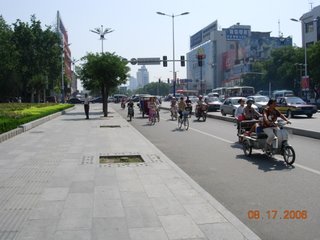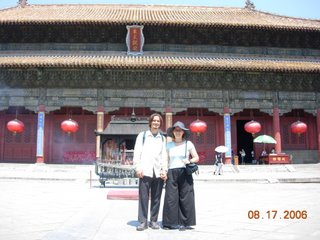Wednesday, September 27, 2006
August 18, Qingdao to Tai An
Our last night in Qingdao, we moved to another guest house in another part of town. Moving across town was like moving to another country. We moved down the coast near where the beer festival was, near a yachting club, and into a hostel run by Koreans. This part of town, a 15 minute taxi ride from the inner city had wide sidewalks, new buildings and freshly trimmed hedges. This was the clean side of town, the rich section, completely separate from where we arrived on our ship. Here, the money was crisp and the rows of restaurants with eels, crabs, clams, snails fish living in shallow pools in styrofoam trays on the sidewalks to keep them fresh and attract customers were not present. Here, the streets didn't stink of fish or sewage. Here, we got our first glimpse of China, the superpower. It finally felt like we had arrived in the country we had read about on the news with its exploding economy and niveau riche.
With Song, Miree and two other Koreans we had just met at the guest house, a brother and sister traveling together, we went to the Tsingtao Beer Festival. A huge festival full of games and beer tents reminiscent of Germany. The beer hall we drank in had a big stage built in the center where people sang Chinese songs to Schlager music.
Aja and her new Korean friend, Eun Young, tried to get Chinese people to play Janken (rock paper scissors -- hugely popular in Japan) with them. They succeeded with a table of middle-aged folks who handed us both beers and chanted for us to chug them. Aja drank two more than she wanted to. We went outside and played circus games and watched fireworks. Then we found a taxi that would take one more passenger than he ought and went out for massages.
Near our hostel was a small massage business that gave super cheap massages (25 yuan~$3). All five of us were put to sleep. They just let us sleep for a long time, and finally we woke each other up, paid and went to bed again. We all ate Kimchee for breakfast and perhaps because of our massages, no one was hung over.
Our train left early, too early for us to have eaten breakfast, but when it was served, I couldn't resist. A slow driving, honking taxi brought us back to the poor part of town, back to the station and we ran through railway security where our bags were x-rayed and found our train. We were the last people to get on the train, and had to run through a thick white cloud of diesel smoke to get on our train.
Our train was pulled out of the station only a moment after we had gotten on. Through the city, we passed gangs of railroad workers without shirts wearing straw hats, sitting around with food or cards or just sleeping wherever there was shade. Before we were out of the city, we passed by dozens of small factories before we went by some truly large factories. Some were at least a mile long, with mountains of coal, criss-crossed elevators for grain, rocks, coal, I can't guess what. Here, we saw more skinny railway workers, mostly not working, families walking along the tracks that led to their factories. It didn't look like scenes of this era; it looked more like old photos of America in the '20s.
Once we were fully out of the city, the countryside was packed with crops. Vast fields of corn stretched out to the horizon and forests of young trees planted in neat rows covered the hills. Small farming villages still gave a slight reminder that this used to be a German colony, but they didn't look like German villages. Rather, a single German house reproduced thousands of times in on of Qingdao's colossal factories. Every house was built the same, but all are in different states of disintegration. It seems like many have been bulldozed, leaving others standing by gardens of rubble.
Further along, towns and cities dotted the landscape underneath a warm brown layer of smog. In nearly every city before Jinan, was at least one prominent cooling tower growing right out of the houses. There was no space between power plants and apartments.
At each stop, our train became more crowded. We moved to our assigned seats next to a nice looking young family. In the seats in front of us, an older man with messy Mao-like hair and blue jeans laid across two seats. When the young lady with a large suitcase and curly hair,whose seat his feet were on got on the train, she scolded him and demanded that he move. With a voice that changed pitch with each word, he flatly refused to move. The young lady raised hell and people bent their necks around their seats, watched curiously and smiled. Eventually, some of the blue-coated train workers came to help, but even they were unable to persuade the balding old man to sit up. Some time later, they came to an agreement that involved another man sitting in the lady's seat, while she stood until a seat opened up at the next stop.
Salesmen walked through the trains. One made the whole car laugh and used us for some of his jokes. Another convinced us to buy some nearly indestructible socks that he beat with a steel brush, pulled a nail through and showed it without any signs of wear.
Arriving in Tai An, we were met at the station by a barrage of people selling maps, offering taxis and hotels and a Tourist Information office that offered absolutely no help. We set off with only our Lonely Planet intent on going to a hotel at the other end of town. Quickly, we got a better offer from a lady boasting a brochure with pictures of hotel rooms for the Long Tan hotel near the station. The picture of the hotel on our key card was of a completely different building and caused us to walk in circles looking for it later that night.
Tai An is a big city with long city blocks. The big streets have separate lanes for the slower moving bicycle, moped and red motorbike rickshaws. Whole families ride by balancing on a single moped. The streets are noisy and stinky. Horns honk constantly as if the city were filled with an everlasting parade. Traffic doesn't stop at red lights and crosswalks are chaotic. Neither pedestrians nor cars have the right of way and are constantly competing for an opportunity to push through the ever-present swarm of bicycles and motor bikes. The green men on crosswalk s move to draw attention, but they are actively ignored.
Our last night in Qingdao, we moved to another guest house in another part of town. Moving across town was like moving to another country. We moved down the coast near where the beer festival was, near a yachting club, and into a hostel run by Koreans. This part of town, a 15 minute taxi ride from the inner city had wide sidewalks, new buildings and freshly trimmed hedges. This was the clean side of town, the rich section, completely separate from where we arrived on our ship. Here, the money was crisp and the rows of restaurants with eels, crabs, clams, snails fish living in shallow pools in styrofoam trays on the sidewalks to keep them fresh and attract customers were not present. Here, the streets didn't stink of fish or sewage. Here, we got our first glimpse of China, the superpower. It finally felt like we had arrived in the country we had read about on the news with its exploding economy and niveau riche.
With Song, Miree and two other Koreans we had just met at the guest house, a brother and sister traveling together, we went to the Tsingtao Beer Festival. A huge festival full of games and beer tents reminiscent of Germany. The beer hall we drank in had a big stage built in the center where people sang Chinese songs to Schlager music.
Aja and her new Korean friend, Eun Young, tried to get Chinese people to play Janken (rock paper scissors -- hugely popular in Japan) with them. They succeeded with a table of middle-aged folks who handed us both beers and chanted for us to chug them. Aja drank two more than she wanted to. We went outside and played circus games and watched fireworks. Then we found a taxi that would take one more passenger than he ought and went out for massages.
Near our hostel was a small massage business that gave super cheap massages (25 yuan~$3). All five of us were put to sleep. They just let us sleep for a long time, and finally we woke each other up, paid and went to bed again. We all ate Kimchee for breakfast and perhaps because of our massages, no one was hung over.
Our train left early, too early for us to have eaten breakfast, but when it was served, I couldn't resist. A slow driving, honking taxi brought us back to the poor part of town, back to the station and we ran through railway security where our bags were x-rayed and found our train. We were the last people to get on the train, and had to run through a thick white cloud of diesel smoke to get on our train.
Our train was pulled out of the station only a moment after we had gotten on. Through the city, we passed gangs of railroad workers without shirts wearing straw hats, sitting around with food or cards or just sleeping wherever there was shade. Before we were out of the city, we passed by dozens of small factories before we went by some truly large factories. Some were at least a mile long, with mountains of coal, criss-crossed elevators for grain, rocks, coal, I can't guess what. Here, we saw more skinny railway workers, mostly not working, families walking along the tracks that led to their factories. It didn't look like scenes of this era; it looked more like old photos of America in the '20s.
Once we were fully out of the city, the countryside was packed with crops. Vast fields of corn stretched out to the horizon and forests of young trees planted in neat rows covered the hills. Small farming villages still gave a slight reminder that this used to be a German colony, but they didn't look like German villages. Rather, a single German house reproduced thousands of times in on of Qingdao's colossal factories. Every house was built the same, but all are in different states of disintegration. It seems like many have been bulldozed, leaving others standing by gardens of rubble.
Further along, towns and cities dotted the landscape underneath a warm brown layer of smog. In nearly every city before Jinan, was at least one prominent cooling tower growing right out of the houses. There was no space between power plants and apartments.
At each stop, our train became more crowded. We moved to our assigned seats next to a nice looking young family. In the seats in front of us, an older man with messy Mao-like hair and blue jeans laid across two seats. When the young lady with a large suitcase and curly hair,whose seat his feet were on got on the train, she scolded him and demanded that he move. With a voice that changed pitch with each word, he flatly refused to move. The young lady raised hell and people bent their necks around their seats, watched curiously and smiled. Eventually, some of the blue-coated train workers came to help, but even they were unable to persuade the balding old man to sit up. Some time later, they came to an agreement that involved another man sitting in the lady's seat, while she stood until a seat opened up at the next stop.
Salesmen walked through the trains. One made the whole car laugh and used us for some of his jokes. Another convinced us to buy some nearly indestructible socks that he beat with a steel brush, pulled a nail through and showed it without any signs of wear.
Arriving in Tai An, we were met at the station by a barrage of people selling maps, offering taxis and hotels and a Tourist Information office that offered absolutely no help. We set off with only our Lonely Planet intent on going to a hotel at the other end of town. Quickly, we got a better offer from a lady boasting a brochure with pictures of hotel rooms for the Long Tan hotel near the station. The picture of the hotel on our key card was of a completely different building and caused us to walk in circles looking for it later that night.
Tai An is a big city with long city blocks. The big streets have separate lanes for the slower moving bicycle, moped and red motorbike rickshaws. Whole families ride by balancing on a single moped. The streets are noisy and stinky. Horns honk constantly as if the city were filled with an everlasting parade. Traffic doesn't stop at red lights and crosswalks are chaotic. Neither pedestrians nor cars have the right of way and are constantly competing for an opportunity to push through the ever-present swarm of bicycles and motor bikes. The green men on crosswalk s move to draw attention, but they are actively ignored.
Friday, September 22, 2006
August 15, Qingdao
We went to the temple of the goddess of heaven, who is also the goddess of the sea. It was a colorfully painted temple with swirly, distinctly Chinese paintings of scenes from old tales of deities, and intricate patterns. Tour groups crowded the temple and were each being led by a fast-talking tour guide holding a flag and talking through a megaphone. Tour groups were coming in, forming so quickly that there was hardly a moment of silence between when one megaphone moved on and the next came to take its place. The groups crowded around the important places, took their pictures and were hurried along to the next site.
Each hall of the temple was uniquely decorated. In the entrance, was a wooden peacock carved out of the stump and roots of a fallen tree, the fused and tangled roots polished into feathers. One room had hundreds of statues painted brightly, guarding a goddess with many arms. Another room was full of monks in robes sitting at tables with magical items, waiting to tell people their fortunes. Another hall had a Buddha in a glass box filled to his neck in worn out paper money of little value, each with a picture of Mao; a display of China's two important philosophies.
On the shore by a busy street and below a wide sidewalk was an old shipwrecked fishing boat with half its hull worn away by time. Old men walked along the rocks looking for crabs to eat or put sell. Where the shipwreck sat was surely in view of where the 2008 Olympic sailing games will be held.
In the old German section of town are large buildings with red tiled roofs and Roman style pillars in the entranceways. Inside, you can see that the wooden stairs are no longer level, and just as you wonder if it is abandoned, a well dressed girl with high heels and a shiny purse walks out.
We came across a park full of old men playing cards and Chinese Chess. Each game was surrounded by a wall of passers by who all seemed to take sides and give advice freely. With each move, the old men would slam their piece on the board, and for a decisive move, they would put their pieces down with even more force to make an even louder noise. The advice coming from the crowd made it a team sport and made sure it would be a good game. Just before each round ended, when it became obvious who had won, the crowd smiled and chuckled. All around, people seem to be enjoying themselves. China seems to have a slow pace and support ample leisure time.
We went to the temple of the goddess of heaven, who is also the goddess of the sea. It was a colorfully painted temple with swirly, distinctly Chinese paintings of scenes from old tales of deities, and intricate patterns. Tour groups crowded the temple and were each being led by a fast-talking tour guide holding a flag and talking through a megaphone. Tour groups were coming in, forming so quickly that there was hardly a moment of silence between when one megaphone moved on and the next came to take its place. The groups crowded around the important places, took their pictures and were hurried along to the next site.
Each hall of the temple was uniquely decorated. In the entrance, was a wooden peacock carved out of the stump and roots of a fallen tree, the fused and tangled roots polished into feathers. One room had hundreds of statues painted brightly, guarding a goddess with many arms. Another room was full of monks in robes sitting at tables with magical items, waiting to tell people their fortunes. Another hall had a Buddha in a glass box filled to his neck in worn out paper money of little value, each with a picture of Mao; a display of China's two important philosophies.
On the shore by a busy street and below a wide sidewalk was an old shipwrecked fishing boat with half its hull worn away by time. Old men walked along the rocks looking for crabs to eat or put sell. Where the shipwreck sat was surely in view of where the 2008 Olympic sailing games will be held.
In the old German section of town are large buildings with red tiled roofs and Roman style pillars in the entranceways. Inside, you can see that the wooden stairs are no longer level, and just as you wonder if it is abandoned, a well dressed girl with high heels and a shiny purse walks out.
We came across a park full of old men playing cards and Chinese Chess. Each game was surrounded by a wall of passers by who all seemed to take sides and give advice freely. With each move, the old men would slam their piece on the board, and for a decisive move, they would put their pieces down with even more force to make an even louder noise. The advice coming from the crowd made it a team sport and made sure it would be a good game. Just before each round ended, when it became obvious who had won, the crowd smiled and chuckled. All around, people seem to be enjoying themselves. China seems to have a slow pace and support ample leisure time.
Thursday, September 14, 2006

中国 China
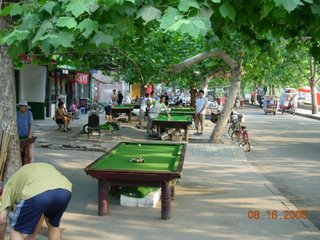 We made it safely to China on the slow boat from Incheon! We barely made it to the ferry terminal on time. From the train station, we eidn't know where to go, my front tire was flat, ans people we asked said it was very far. We left our bikes unloked on a busy street and flagged a taxi, hoping we would not return to our bicycles.
We made it safely to China on the slow boat from Incheon! We barely made it to the ferry terminal on time. From the train station, we eidn't know where to go, my front tire was flat, ans people we asked said it was very far. We left our bikes unloked on a busy street and flagged a taxi, hoping we would not return to our bicycles.At the terminal, there was nowhere to exchange money and Korea suprised us with its price tag, so we had just less than enough cash to buy our tickets. I had to use my credit card, and am not sure if I exhausted the credit I had overpaid my balance with before I left Japan.
Our boat to China was even larger than the ship we took from Japan! From the enterance, there were two escalators leading up to the three stories of passenger ship, perhaps 40 feet above the water.
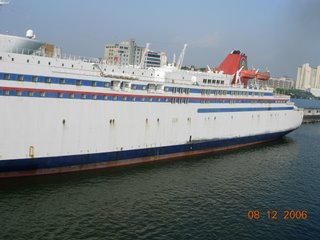
In the harbor, little silver fish swam along the edge of the boat and seagulls flew in big circles hoping to catch cheetohs from young passengers. The ship's huge engines thundered and sent a steady black cloud downwind.
People waited on deck, excited, taking pictures, feeding the birds, leaning over the rails and making new friends. One boy with a Japanese-style blowdried and died hair wearing first a grey and then a pink version of the same shirt that said something in Engrish about alcohol, cigarettes and party was taking pictures of himself for most of the trip. We watched him standing on deck with his cell phone, striking cheezy poses, and sometimes asking other passnegers to take his picture for him.
As the sun set, we were passing an island half hidden by fog. The sun set behind it giving its rocky shillouette a colorful background (see the picture in a earlier post). We learned from a drunken Korean that it was a North Korean island, "a sad story". Perhaps it was North Korean. Perhaps that's why we were heading South at sunset and why the trip to Qingdao took 18 hours while the trip from Fukuoka took only six.
At night, we saw a horizon full of light. It looked almost like a far off city. The whole horizon glowed. It took hours to pass, and turned out to bebe a huge array of ships shining huge floodlights into the water. We assumed they were fishing for Squid.
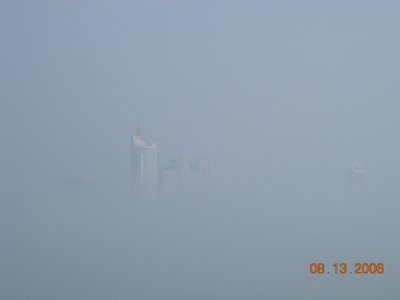
In the morning, our first sight of China was a rocky island with a few trees on top and dozens of container ships on their way to stock the world's shelves with China's junk. Then, a thick fog surrounded usand from the deck, the water was barely visible. I didn't see anything until our ship was just off the coast of Qingdao. The fog was still thick and only the tops of skyscrapers were visible, floating in the grey morning fog.
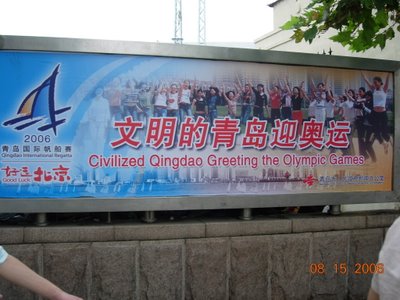 Past customs and onto the street, on solid ground with a new group of friends, I traded some Won with a Korean named Song. The five of us tried unsuccessfully to flag a taxi until an older couple with a rickety van offered to take us to town for 30 Yuan. We wound up in a hotel with a fancy reception and small musty rooms with crickets in the sink on a dingy crunbling street in the center of downtown. China is poorer than I'd expected. Buildings everywhere are patched together, laundry is hanging everywhere people can manage to hang it, sometimes blocking the sidewalks, the sidewalks have missing stones, old people sit on rugs and plastic chairs along the streets, there are no stop lights, old crappy cars are all you see. We went into a large bank to change money, the roof and high walls inside had chipping paint and old water stains.
Past customs and onto the street, on solid ground with a new group of friends, I traded some Won with a Korean named Song. The five of us tried unsuccessfully to flag a taxi until an older couple with a rickety van offered to take us to town for 30 Yuan. We wound up in a hotel with a fancy reception and small musty rooms with crickets in the sink on a dingy crunbling street in the center of downtown. China is poorer than I'd expected. Buildings everywhere are patched together, laundry is hanging everywhere people can manage to hang it, sometimes blocking the sidewalks, the sidewalks have missing stones, old people sit on rugs and plastic chairs along the streets, there are no stop lights, old crappy cars are all you see. We went into a large bank to change money, the roof and high walls inside had chipping paint and old water stains.Qingdao is one of China's wealthiest cities in one of China's wealthiest provinces. An old German colony with disintegrating old German architecture adn good German beer. A sprawling old city with wide sidewalks and people selling things everywhere. The only place Aja can think to compare it to is, maybe, Cuba. It looks poorer than Chilie, she says. Perhaps this is what all cities will eventually look like.
We can't read menus and are doing our best to avoid water, undercooked meat, washed vegetables, and anything that could make us sick. No fresh food until we leave!
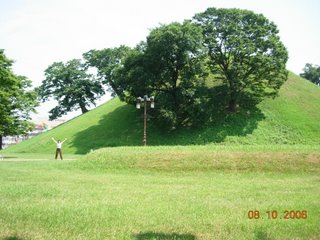
Gyeong-Ju
We spent our last three nights in Korea at a hostel run by a Mukashi-Nihonjin (old or ex- Japanese) in Gygongju. He had a small old voice, just like our Japanese teacher in Japan.
Gygongju was the ancient capital of the Silla empire, and today, it is a proud city. In its parks are huge burial mounds of Silla kings whose names have mostly been forgotten. The city is full of stinky fish markets and bustling streets with a seemingly unreasonable number of shops selling clothes. Just like in Japan, teh young people here wear silly English shirts that say things like "Return to Africa", "World Without Strangers", "Every Jack and Lucy Gill"....
Korea is hot. Scorching sun, high humidity, we drink lots of bottled water. There are more churches than temples, and they all look the same. At night they all have a big glowing red cross high in the sky. The downtown streets are lit with neon at night, but are surprisingly silent. The countryside here is more like Europe's than Japan's -- wide valleys with only glowing green rice fields, and no houses. In Japan, I never saw flat land that wasn't dotted with houses. Only plastic greenhouses and long plastic umbrellas covering the rows of vineyards reminded me of Japan. Some towns here consist almost entirely of highrise apartments. A few vertical neighborhoods and then countryside, fields and forest again. The Koreans seem to have the same love of building bridges over towns and fields as teh Japanese. Korean forests are less managed. Crooked, nobbly pines are most common--not the good straight lumber-forests of Japan.
Korea has visible problems. Poverty, beggars with damaged limbs who crawl through subway cars, who yell at people who don't give, who display their injuries, who wait in the sun for pocket change. They don't hide it in Korea. People fight, have arguements in the street. We saw an old man shove an old lady as she shouted at him and threw cardboard at him. Farmers sit on the sidewalk or on pieces of styrofoam and sell wilting vegetables and bruised fruit. They sell them for almost nothing. Perhaps Japan would be less shy and superficial if it were poorer. I wonder what it was like when it was poor, if I would recognize the culture the Japanese grandparents grew up in.
On the trains and subways, people will come on to sell things. On this train, a man walks through the train chanting like a monk and carrying bags of dried squid, and now he's changed to selling something else. On the subways in Pusan, one man sold a vegetable slicer and covered his face with thin slices of cucumber during his well-rehearsed skit. He even sold a few for $5 each. Another salesman, who didn't sell anything while we watched, sold mats that were foil on one side and tatami on the other. He folded them and unfolded them, giving reasons we didn't understand why we should buy them.
In Korea, there are only 250 last names.
